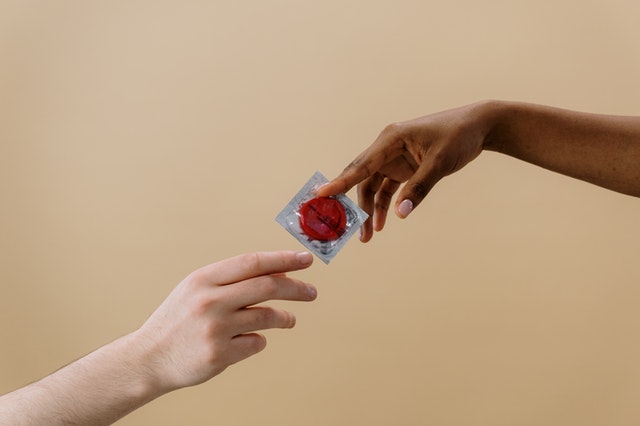Dr Patrick French is a sexual health adviser and genitourinary medicine (GUM) consultant at the Mortimer Market Centre in London. He answers some common questions about sex.
Watery discharge
I've got a watery discharge, which smells really unpleasant and fishy. I'm scared of going to my doctor because he knows my mum. What could it be? Could it go away on its own?
Dr French says:
"I don't think that this will be anything particularly serious, but it's very important that you get this checked out. The most likely cause of this sort of problem is an extremely common infection called bacterial vaginosis (BV).
"It isn't sexually transmitted, and it's easy to diagnose and cure. Go to your local sexual health or GUM clinic, which can tell you at your first visit exactly what's going on and give you treatment. You can refer yourself to these clinics. They're free and completely confidential.
"Although your doctor knows your parents, he or she has a duty to respect your right to confidentiality in the UK if you ever go to them for advice or treatment."
Spots on my penis
I have small spots on the testicles and some on the penis. Should I be worried?
Dr French says:
"I wouldn't worry if I were you. There are lots of normal hair follicles and glands on the testicles and penis, which all men have, and don't cause any problems. But I can't be completely certain, because there are a number of skin problems that start as small spots and need treatment.
"I'm thinking particularly of genital warts, which start as pinkish lumps on the genitals, and grow in size and number. To be extra sure, I would suggest that you make an appointment at your local sexual health or GUM clinic, where the staff can tell you there and then if there's anything to worry about."
Can HIV get through condoms ?
I recently had sex for the first time with my boyfriend. We used a condom, but I'm not sure if it was enough protection against HIV. One of my friends says that HIV can get through the tiny holes in the rubber. Is she right?
Dr French says:
"As often happens with friends, she's wrong. If used properly, condoms are extremely good protection against HIV and many other sexually transmitted infections (STIs). They're also useful at preventing unintentional pregnancies, although many women use a more reliable form of contraception as well as condoms to ensure they're protected against both STIs and unwanted pregnancy. Condoms don't have tiny holes in them."
I need emergency contraception
Where can I get the morning after pill? I had sex with my boyfriend last night and we didn't use a condom. Can I get the pill today, because I don't want to leave it too late?
Dr French says:
"There are 2 types of emergency contraception pill (known as the morning after pill) . Levonelle works for up to 72 hours after you've had unprotected sex, and ellaOne works for up to 120 hours. But the sooner you use it, the more effective it will be. You can also visit your doctor and have an IUD or coil fitted to protect you against pregnancy. This can be done up to 5 days after unprotected sex."
Pain after anal sex
I recently had anal sex with my boyfriend for the first time. Since then I have terrible pain in the end of my penis when urinating. We didn't use a condom. Do you think I've injured myself or caught an infection?
Dr French says:
"It's unlikely that you've injured yourself, but it's more likely that you've caught an infection. I would strongly suggest going to your local sexual heath (GUM) clinic for a sexual health check-up. If you have an infection, it's almost certainly easy to cure.
"Having unprotected sex with your boyfriend definitely puts you at risk of infections that are hard to treat, such as HIV and hepatitis B. When you go to the clinic, make sure that you get a hepatitis B vaccine. Take your boyfriend with you."
"The health adviser at the clinic can talk to both of you about safer sex, and how to avoid HIV and other infections."
You can find a clinic address in the phone book under "sexual health", or by calling the national sexual health line.
Itchy penis
My penis itches a lot each time I go to the toilet to pee. It's been like this for a long time, but has got worse recently. I've heard that yoghurt can treat this type of thing. I ate a big pot this morning, but it still itches.
Dr French says:
"Do you have a rash on the head of your penis, or is it sore when you pee? If you have a rash, you might have thrush. This is a common infection, which is caused by a fungus and isn't sexually transmitted. Clotrimazole cream from your pharmacy should sort out the problem. If this doesn't work, go to your local sexual health clinic for a check-up.
"If you have pain when you pee, you may well have an STI in the tube of your penis. Get this checked out and treated at your local sexual health (GUM) clinic, or see your doctor.
"There's no evidence that yoghurt can clear up an infection. Some women find that it helps with symptoms of thrush, but only if applied to the affected area, not if you eat it."
Find out about thrush in women and thrush in men.
Vaginal discharge
Since last week I've noticed a light substance coming from my vagina. It doesn't smell bad, but it doesn't normally happen. Can you suggest a cream to get rid of it?
Dr French says:
"It's normal for women to have some fluid coming from the vagina (vaginal discharge), and it's quite likely that this "substance" is your normal vaginal fluid. But if it's a new problem, you may have a vaginal infection.
"The most common infections that cause this problem aren't sexually transmitted, but I would suggest that you go to your local sexual health clinic for a check-up. The clinic is confidential and you can refer yourself. You should be able to find out there and then if you have an infection. Or you could see your doctor."
Could I have an STI from years ago?
I had unprotected sex when I was in my early 20s. Could I be carrying an infection and not know it?
Dr French says:
"It's possible for infections such as HIV to take years before any symptoms show. About 1 in 6 people with HIV in the UK haven't been diagnosed. Chlamydia often has no symptoms, but it can affect your fertility, if left untreated. If you're in any doubt, arrange for a check-up with your local GUM clinic."
Could I be infertile from a previous infection?
I had an infection when I was younger and had it treated. Now I'm thinking about starting a family. Which infections could stop me from having a baby?
Dr French says:
"Chlamydia and gonorrhoea can both lead to infertility if left untreated, although most people who have had these infections don't have any permanent problems.
"Chlamydia is easy to treat once it's detected, but many people with chlamydia have no symptoms and are unaware of their infection. If you think you might be at risk, go for a check-up and test. Testing for chlamydia is now quick, painless and easy to do, with most people just having a urine test or self-taken swab."
Find out about chlamydia symptoms.
Do I need to tell my partner about my STI history?
I had treatment for an infection a few years ago and it hasn't come back. Do I need to tell my new girlfriend about it?
Dr French says:
"It depends on which STI you had. Some can be completely cured with antibiotics, but others may recur or cause no symptoms.
"It's generally good to be open about your sexual history with a new partner and always practise safer sex by using a condom. If you're not sure, ask your local doctor's surgery or sexual health (GUM) clinic."
Find your nearest clinic, or you can look up a clinic address in the phone book under "sexual health".
Can you carry an STI but not actually get it?
I've heard that people can carry diseases without getting infected themselves. Are there any infections that are caught only by men or only by women?
Dr French says:
"No, it's not possible to carry a disease without being infected yourself. However, it's common to have an STI without any symptoms, but still pass it on to someone when you have sex with them. There are no STIs that are only caught by men or only caught by women. If you think that you may be at risk of an STI, the only way to find out is by having an STI check-up."
If my partner has an STI, do I need treatment, too?
My girlfriend has got chlamydia and says I need to get treatment. But I've got no symptoms, so what's the point?
Dr French says:
"Your girlfriend is right. It's very important that you go for treatment even if you've got no symptoms, because most people who have chlamydia have no symptoms.
"If you don't get treatment, you'll pass this infection back to your girlfriend. Chlamydia can be a very serious problem, particularly for women, who can become infertile if it's not treated."
Should I get checked out for STIs?
Do you think I should have a regular check-up at a clinic? My last visit was 2 years ago, but I've had 6 or 7 partners since then.
Dr French says:
"Yes, a check-up would be a good idea. A lot of STIs cause no symptoms, and having a check-up is very straightforward. If you've moved since your last clinic visit, you can find your nearest clinic here."
How long is treatment?
How long does a course of treatment for an STI usually last?
Dr French says:
"There's no average, because all STIs are different. Many STIs are treated with one-off doses. However, some courses of treatment last 1 week or can be longer."
What happens when they test for infections?
I've got a rash and I'm scared, but I'm also scared about what will happen if I go to a clinic. Will it hurt?
Dr French says:
"No, it won't hurt. Usually a doctor or nurse will ask about your sexual history and advise you which tests you'll need. Nowadays, many people who have an STI check-up no longer need an internal examination or any swabs, although women may be asked to take a vaginal swab.
"Usually, you'll only need to take a blood test for HIV and syphilis, and a urine test or self-taken swab for chlamydia and gonorrhoea. Some women need to have an internal vaginal examination with swabs. Some men may need to have a small swab taken from the tip of the penis.
"Staff will explain the procedure to you. You're in control, so tell them if you aren't happy with any test that they suggest."
Find out about visiting an STI clinic.
Can I see a woman doctor?
I don't want to discuss my business with a man because it's embarrassing. Can I ask to see a woman doctor?
Dr French says:
"Yes, absolutely. No-one can make you see a male or female doctor or nurse if you don't feel comfortable. Occasionally, you may have to wait a little longer until someone suitable becomes available."
Can I get HIV without having sex?
I've heard that HIV is a risk when we go abroad. Is there any risk of getting HIV if you don't sleep with someone on holiday, but do other sexual things instead?
Dr French says:
"Providing that you don't have unprotected (without a condom) vaginal or anal sex, it's very unlikely that you'll be at risk of HIV. There's no risk of getting HIV from kissing and touching.
"If you give a man oral sex, there's a small risk of getting HIV, particularly if he ejaculates in your mouth. Some people use condoms (you can get flavoured condoms) for oral sex.
"There's no risk of HIV if a man gives you oral sex."
Can I catch an STI from having a bath?
I'm sharing a bathroom with students and have heard you should disinfect the tub before bathing, as you never know if any of the people who use the same tub have STIs. How likely am I to catch an STI from someone by sharing a tub? What about bathing together with someone who has an STI? Should I get tested?
Dr French says:
"I think it's a good idea to rinse out the bath with some water after someone has just used it – after all, you don't want to have a bath in someone else's dirt! But you don't need to disinfect the bath. This is not a way that STIs are passed on. For more information about STIs, call a national sexual health line."
I have more sexual health questions. Who can I talk to?
You can find a clinic address in the phone book under "sexual health", or by calling a national sexual health line.





